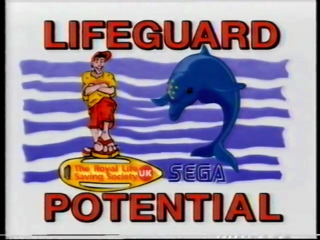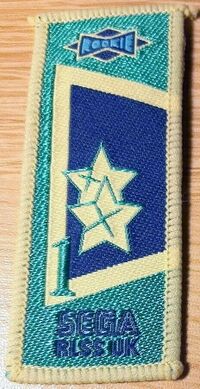Difference between revisions of "Lifeguard Potential"
From Sega Retro
m |
m |
||
| (One intermediate revision by one other user not shown) | |||
| Line 1: | Line 1: | ||
| − | {{ | + | [[File:LifeguardPotential VHS UK title.png|thumb|right|320px]] |
| + | {{stub}}The '''{{PAGENAME}}''' program, devised in 1993, was an official United Kingdom educational initiative aimed to promote water safety among children and young adults through a unique collaboration involving popular culture and video gaming. Sponsored by the [[wikipedia:Royal Life Saving Society UK|Royal Life Saving Society]], it was part of Sega's broader strategy to engage with its audience beyond traditional marketing avenues. The program's primary objective was to educate children about water safety through informational VHS tapes distributed to primary schools in the United Kingdom, leveraging the popularity of the TV show ''[[wikipedia:Baywatch|Baywatch]]'' and Sega's ''[[Ecco the Dolphin]]''. The campaign emphasized crucial safety messages, such as the importance of swimming in designated areas, and the basics of first aid and rescue techniques.{{ref|https://web.archive.org/web/20240526103742/https://www.sonicstadium.org/forums/topic/8896-sega-lifeguard-potential-featuring-ecco/}} | ||
| − | The precise nature of this campaign is not known, however a short promotional video was produced for schools, as was accompanying learning material.{{magref|powerup|1993-04-27| | + | ==History== |
| + | ===Background=== | ||
| + | The {{PAGENAME}} program was created in 1993 by the [[wikipedia:Royal Life Saving Society UK|Royal Life Saving Society]] in conjunction with [[Sega]]. It was designed to teach children the importance of water safety as part of the United Kingdom's National Curriculum, which had recently become mandated to educate children on these sorts of life skills. It is imagined that the oyal Life Saving Society wanted Sega to make their teachings more appealing to the youth of the day, while Sega wanted to distance themselves from the non-active and unhealthy stereotype of video games. | ||
| + | |||
| + | ===Release=== | ||
| + | [[File:Sega RLSS Patch 1 alt.jpg|thumb|right|200px]] | ||
| + | Sega distributed information packs and videos to approximately 25,000 primary schools in the [[History of Sega in the United Kingdom|United Kingdom]]. These packs included a promotional VHS tape (produced by Sega's marketing team with assistance from the [[wikipedia:Royal Life Saving Society UK|Royal Life Saving Society]] featuring ''[[wikipedia:Baywatch|Baywatch]]'' cast members like [[wikipedia:David Hasselhoff|David Hasselhoff]], and popular British TV personality [[wikipedia:Chris Evans (presenter)|Chris Evans]].{{magref|powerup|1993-04-27|6}} The videos attempted to combine entertainment with education, showing the ''Baywatch'' cast delivering safety tips and using clips from ''[[Ecco the Dolphin]]'' to illustrate points about the dangers of water and the need for caution. | ||
| + | |||
| + | Additionally, schools received worksheets and certificates to reinforce the lessons taught in the videos. The educational materials aimed to make learning about water safety both fun and memorable for children.{{ref|https://web.archive.org/web/20240526103742/https://www.sonicstadium.org/forums/topic/8896-sega-lifeguard-potential-featuring-ecco/}} The precise nature of this campaign is not known, however a short promotional video was produced for schools, as was accompanying learning material.{{magref|powerup|1993-04-27|6}} Many leisure centers also got in on the act, teaching swimming lessons and lifesaving skills with similar material. | ||
| + | |||
| + | ===Reception=== | ||
| + | Reception to the program was mixed. While some appreciated the innovative approach to safety education, others criticized it for blending educational content with what they perceived as subtle marketing for Sega products. Critics argued that the strong brand presence in the educational materials detracted from the safety messages. However, supporters noted that the use of familiar characters and themes from popular culture helped capture children's attention and made the safety lessons more relatable and engaging.{{ref|https://web.archive.org/web/20240526103742/https://www.sonicstadium.org/forums/topic/8896-sega-lifeguard-potential-featuring-ecco/}} | ||
| + | |||
| + | Despite any criticisms, {{PAGENAME}} is remembered as a creative attempt to address an important issue using the tools of entertainment and media familiar to its target audience. Reportedly, it was available to be purchased directly from the [[wikipedia:Royal Life Saving Society UK|Royal Life Saving Society]] as late as 2016.{{ref|https://www.facebook.com/RLSSPresident/posts/stunned-that-rlss-uk-are-still-selling-the-sega-lifeguard-potential-vhs-tape-1-5/1034126233290390/}} | ||
| + | |||
| + | ==Magazine articles== | ||
| + | {{MainArticle|{{PAGENAME}}/Magazine articles}} | ||
==Video== | ==Video== | ||
| − | + | {{gitem|LifeguardPotential UK Video.mp4|VHS video}} | |
| − | + | ||
| − | LifeguardPotential UK | + | ==Physical scans== |
| − | + | {{Scanbox | |
| + | | console=VHS | ||
| + | | region=UK | ||
| + | | front=LifeguardPotential VHS UK box front.png | ||
| + | | back= | ||
| + | | top= | ||
| + | | cassette= | ||
| + | }} | ||
==Gallery== | ==Gallery== | ||
| Line 21: | Line 45: | ||
==References== | ==References== | ||
| − | <references /> | + | <references/> |
[[Category:Sponsorships]] | [[Category:Sponsorships]] | ||
Latest revision as of 06:38, 26 May 2024
This short article is in need of work. You can help Sega Retro by adding to it.
The Lifeguard Potential program, devised in 1993, was an official United Kingdom educational initiative aimed to promote water safety among children and young adults through a unique collaboration involving popular culture and video gaming. Sponsored by the Royal Life Saving Society, it was part of Sega's broader strategy to engage with its audience beyond traditional marketing avenues. The program's primary objective was to educate children about water safety through informational VHS tapes distributed to primary schools in the United Kingdom, leveraging the popularity of the TV show Baywatch and Sega's Ecco the Dolphin. The campaign emphasized crucial safety messages, such as the importance of swimming in designated areas, and the basics of first aid and rescue techniques.[1]
Contents
History
Background
The Lifeguard Potential program was created in 1993 by the Royal Life Saving Society in conjunction with Sega. It was designed to teach children the importance of water safety as part of the United Kingdom's National Curriculum, which had recently become mandated to educate children on these sorts of life skills. It is imagined that the oyal Life Saving Society wanted Sega to make their teachings more appealing to the youth of the day, while Sega wanted to distance themselves from the non-active and unhealthy stereotype of video games.
Release
Sega distributed information packs and videos to approximately 25,000 primary schools in the United Kingdom. These packs included a promotional VHS tape (produced by Sega's marketing team with assistance from the Royal Life Saving Society featuring Baywatch cast members like David Hasselhoff, and popular British TV personality Chris Evans.[2] The videos attempted to combine entertainment with education, showing the Baywatch cast delivering safety tips and using clips from Ecco the Dolphin to illustrate points about the dangers of water and the need for caution.
Additionally, schools received worksheets and certificates to reinforce the lessons taught in the videos. The educational materials aimed to make learning about water safety both fun and memorable for children.[1] The precise nature of this campaign is not known, however a short promotional video was produced for schools, as was accompanying learning material.[2] Many leisure centers also got in on the act, teaching swimming lessons and lifesaving skills with similar material.
Reception
Reception to the program was mixed. While some appreciated the innovative approach to safety education, others criticized it for blending educational content with what they perceived as subtle marketing for Sega products. Critics argued that the strong brand presence in the educational materials detracted from the safety messages. However, supporters noted that the use of familiar characters and themes from popular culture helped capture children's attention and made the safety lessons more relatable and engaging.[1]
Despite any criticisms, Lifeguard Potential is remembered as a creative attempt to address an important issue using the tools of entertainment and media familiar to its target audience. Reportedly, it was available to be purchased directly from the Royal Life Saving Society as late as 2016.[3]
Magazine articles
- Main article: Lifeguard Potential/Magazine articles.
Video
Physical scans
Gallery
Swimming badges
References
- ↑ 1.0 1.1 1.2 https://www.sonicstadium.org/forums/topic/8896-sega-lifeguard-potential-featuring-ecco/ (Wayback Machine: 2024-05-26 10:37)
- ↑ 2.0 2.1 Power Up!, "Tuesday, April 27, 1993" (UK; 1993-04-27), page 6
- ↑ https://www.facebook.com/RLSSPresident/posts/stunned-that-rlss-uk-are-still-selling-the-sega-lifeguard-potential-vhs-tape-1-5/1034126233290390/









